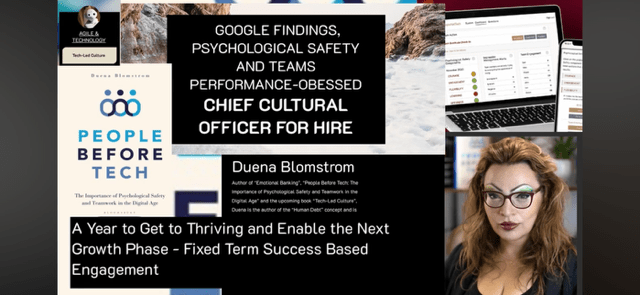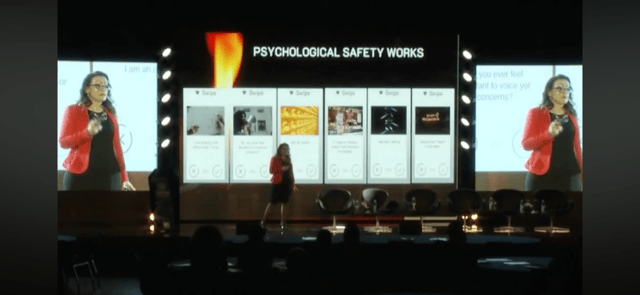Unlock the full potential of your people and business through Psychological Safety, EQ, the findings of Google’s Aristotle, the principles of fearless, happy, safe, generative learning cultures and the Tech Led Culture methodologies proven to lower HumanDebt™ by listening to creator of the concept on a crusade to change the worlds’ workplaces.
Author, influencer and podcaster Duena Blomstrom brings a unique perspective on workplace dynamics, shaped by her multifaceted career spanning technology, HR, sales, marketing, and leadership strategy.
Her varied experience fuels advocacy for a harmonious integration of people and technology.
She explains: “I’m not sure how clear my long and meandering journey through product, technology, and strategy has been to anyone reading this, but I have been fortunate enough to experience the ins and outs of both large and small organisations. These organisations range from horribly bureaucratic to impressively innovative, or in other words, from toxic environments to those that foster creativity.”
Observing this spectrum has led Blomstrom to believe the answers already exist for creating more collaborative corporate cultures.
“It’s not being kept from us. There’s no conspiracy surrounding the knowledge of what it takes for an organisation to foster a generative culture that is essential for sustaining high performance.”
Emotional connection
She believes that the missing link is addressing the lack of training, support and recognition that rule old school and antiquated HR structures that dont quite understand that in order to create the technology we need and innovation we crave we have to first and foremost create a culture of zero HumanDebt™ through continuous personal and team human work on emotions.
“We need to do this in conjunction with agile and continuously improving ethical techniques for creating technology. This approach will allow us to grow at a pace that enables us to harness the potential of AI while preserving our humanity.”
Blomstrom advocates discarding traditional HR strategies centered on retention and policies.
“Instead of focusing on retention, talent, and policies, empower your HR professionals to genuinely assist the courageous tech leaders who want to shape the new reality of work.”

That starts with teams characterised by psychological safety rather than toxicity, she argues.
“If you look around and find no real teams at any level of the organisation, but instead working groups characterised by posturing, impression management, and fear instead of the ‘humanising’ we need, then you have nothing at all.”
The pandemic forced a long overdue rethink of work, but while the shift to remote work proved its viability, Blomstrom is concerned that many companies are missing the chance to fully commit to it.
“Many enterprises have missed the opportunity to fully embrace it, considering their people within their business with depth and empathy, starting from a clean slate (tabula rasa). This approach would have allowed them to rebuild around remote work and the idea of Zero Human Debt.”
Her software product “People Not Tech” aims to guide organisations through this transition to create genuinely human-centric hybrid work.
The return to office
While there is an ongoing push for RTO (return to office) Blomstrom firmly believes the changes brought on by the pandemic are here to stay, ushering in a new generation with different expectations.
“All the changes we have experienced will eventually become the new norm for the upcoming generations entering the workforce. These generations are not a distant future topic; they are a reality today.”
With more “trauma-informed” and neurodiverse professionals demanding adaptations and emotional intelligence in work, the era of resources that could be easily directed and controlled by micromanagers is behind us, she says.

When it comes to technology’s role, Blomstrom resists positioning it in opposition to people, instead believing that it can be useful servant rather than a dictator.
“When confronted with the dichotomy between people and tech, I find it uncomfortable to provide a definitive answer. To me, it seems to validate the notion of opposing sides.”
Her companies PeopleNotTech and Tech Led Culture reflect her view that the two elements can and should symbiotically coexist.
The concept of “HumanDebt™” describes the damage organisations inflict when this balance is not struck. Blomstrom first conceived of it while advocating human-centered design.
She realised, “All my advocacy for service design, human-centered design, agility, and more would be utterly futile if an organisation was burdened with Human Debt.”
Resolving this debt by prioritising people in an honest and authentic way is the first step to solving the issue she believes.
“They too come to the realisation that it all boils down to people, and they cannot embark on genuine human-centered work until they address the existing toxicity of the deep-seated Human Debt that plagues most organisations.
“To achieve long-term success, begin with a foundation of Zero Human and Tech Debt , and then maintain it by prioritising teams, fostering psychological safety, and nurturing emotional closeness through radical honesty and respect.”

Elite Business Live
Blomstrom will be further delving into the subject at Elite Business Live, in March.
“As always, I will be discussing TechLedCulture with a profound understanding that the future of technology lies in comprehending and supporting the most human side of our people. This transformation will require a serious reprogramming of the traditional office norms, which often emphasised a corseted professional image that was uniform, neurotypical, compliant, non-questioning, and primarily focused on execution without contributions.
“These norms are no longer acceptable in the workplaces of the future. Instead, our children and our children’s children will work in environments where it would be considered offensive to be referred to as a mere “resource,” and it will be seen as discriminatory to have one’s emotions disregarded carelessly by colleagues.
These future workplaces will value diversity and uniqueness, where the more different and diverse one is, the more they are appreciated by the team and the enterprise. Here, being neurodiverse and queer will be the norm, not the exception.”
If they take her advice, companies can transform outdated professional norms into workplaces that embrace uniqueness and diversity powered by technology used in service of people, not in place of.
Join Duena at Elite Business Live 2024 as she takes to the main stage to deliver an inspiring keynote and join the panel discussion on Using Data and Technology to Transform Your Business on Day 2. Given Duena’s expertise, this is not one to miss! Click here to register now.
Share via:








































